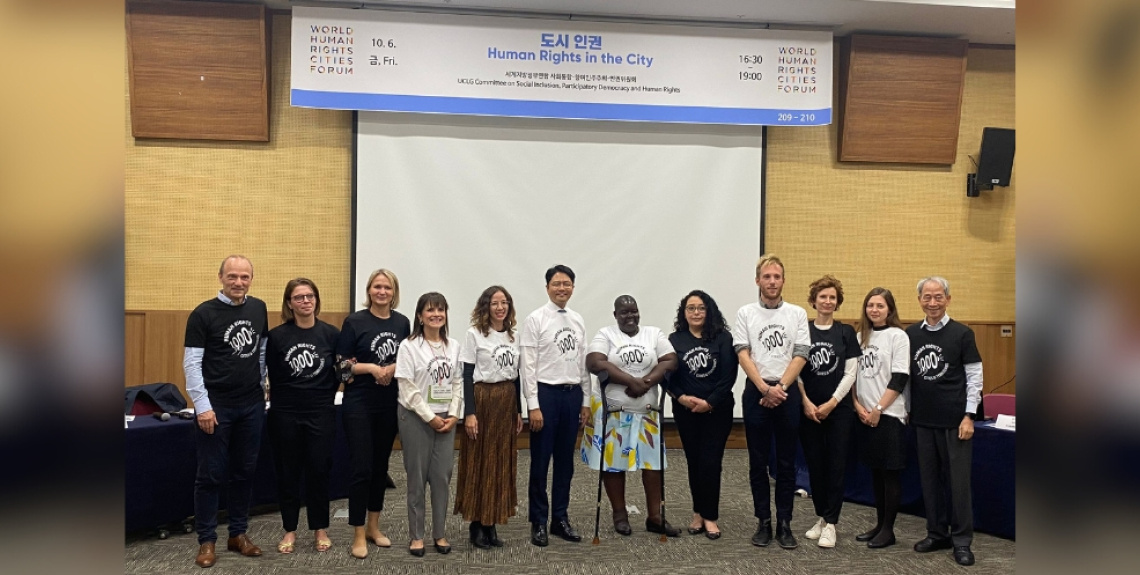From 4 to 6 October 2023, the 13th Gwangju World Forum of Human Rights Cities (WHRCF) was the occasion to push forward face-to-face the process of updating the Human Rights Charter-Agenda in the City of UCLG. Six member cities and four partners participated in the session, aiming to review the contents of the rights included in the updated structure of the Charter-Agenda proposed by the Steering board responsible for overseeing this process, which was launched remotely by our Committee in May 2023 to define a common international human rights framework at local level.
Learn more about the process of updating the Charter-Agenda.
KIM Gwang-jin Deputy Mayor of Culture and Economic Affairs of Gwangju Metropolitan City opened the session by praising the update process of the Charter-Agenda for its dedication to promoting human rights. Our coordinator Amanda Fléty recalled that:
this updating process strives to broaden the global Human Rights Cities movement, together with our global campaign "10, 100, 1000 Human Rights Cities and Territories by 2030."
Morten Kjaerum, Director of the Raoul Wallenberg Institute, highlighted that the first draft of the updated Charter-Agenda is relevant for addressing the provision of basic services for alleviating poverty and safeguarding a sustainable environment, two areas directly related to the Sustainable Development Goals (SDGs) and the promotion of the Human Rights 75 initiative.
The gathered cities shared their municipal experiences in respecting, protecting and fulfilling the human rights of their inhabitants:
-
Cities in Indonesia have drawn inspiration from the Mothers of Plaza de Mayo movement in Argentina and trade union movements in South Africa to prevent human rights violations, as explained by Mugiyanto, Human Rights Advisor to the Executive Office of the President of the Republic of Indonesia.
-
In Marseille, they pay special attention to specific groups such as migrants and children, as Deputy Mayor Audrey Garuno pointed out. They also take care of the most vulnerable neighbourhoods by renovating basic services -such as housing and schools- training public servants and approaching the population directly to make them aware that they are subjects of rights, as Anatole Puiseux, Director of Social Services, shared.
-
In San Antonio (Chile), they focus on guaranteeing access to justice by training public officials, using simple language that is close to the citizens and leveraging the interdepartmental coordination that comes with working at the local level, said Rubí Cabrera, Coordinator of the Ombudsman's Office.
-
In Kisumu, they work to ensure access to human rights for persons with disabilities by ensuring their equal representation in decision-making, improving accessibility in the built environment, allocating specific budget for this group, and relying on international collaboration with organisations such as the UN and UCLG, as Caroline Agwanda, Disability Advisor to the Kisumu County Government, said.
-
In Barcelona, they are implementing a financial inclusion strategy for people without documents, with the aim of giving them access to a basic payment account, described Anabel Rodríguez, Director of the Directorate of Citizenship Rights Services in Barcelona.
-
In Ciudad Juárez, in the midst of a challenging context of insecurity and growing migratory traffic, they promote the right to the city from a social inclusion perspective through co-creation with women, youth and children, shared Verónica González, Director of Resilience, and Xóchitl Cruz, advisor of this institution.
Prof. Gyonggu Shin, Executive Director of the International Human Rights Training Centre of Gwangju Metropolitan City, outlined some aspects to guide the next steps in the process of updating the Charter-Agenda: "It is crucial that, more than recipients, people are actively engaged in the global movement and promotion of human rights. As Morten Kjaerum summed up: "We already have a very well-established approach: to respect, protect and fulfill human rights. My dream is that we can add a fourth: engaging people to actively participate.”
Six cities and their political representatives participated in the session:
-
Mr. KIM Gwang-jin, Deputy Mayor for Culture and Economic Affairs, Gwangju Metropolitan City
-
Mr. Anatole Puiseux, Social Affairs Director, City of Marseille
-
Ms. Rubi Cabrera Aguilera, Coordinator of the Office of the Ombudsman Municipality of San Antonio Chile
-
Ms. Caroline Agwanda, Governor's Advisor on Disability, Kisumu County Government
-
Ms. Veronica Gonzalez, Director of Resilience and Ms. Xochitl Cruz, Resilience Department, City of Ciudad Juárez
-
Ms. Ana Isabel Rodríguez Basanta, Director of Citizenship Rights of the City of Barcelona
They were accompanied by Mugiyanto, Human Rights Advisor to the Executive Office of the President of the Republic of Indonesia; Morten Kjaerum, Director of the Raoul Wallenberg Institute; Mr. Gyonggu Shin, Executive Director at International Human Rights Training Center of Gwangju Metropolitan City. Carlos Carroza, from the Human Rights Observatory of Chile, and Sneh Aurora, Human Rights Education expert and Director of the Commonwealth Human Rights Initiative, joined remotely.
Read the full report of the session here


